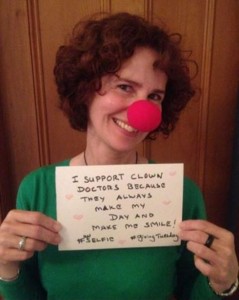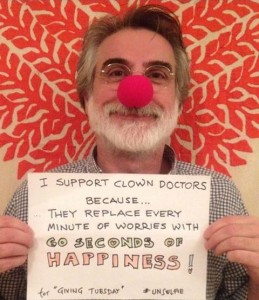

Founder, CEO and Creative Director Professor Thomas Petschner’s ultimate utopia is for clown doctors to be in every hospital as part of the hospital’s daily routine.
“We have helped 70,000 patients in the last five years.
“Like people wash their hands as part of hygiene at the hospital, I would like to have clown doctors become part of the mental hygiene. It is something that should be in every hospital and be absolutely normal and necessary.
“Knowing you have helped that many people motivates you and in many situations, as a clown doctor, the patients have changed my life and those of the people that I work with. It is extra special when you work with someone who knows they are going to die and you are able to get a smile out of them.”
Arriving in New Zealand nine years ago Petschner was dismayed to find there were no clown doctors practicing here. He immediately spoke to his colleague Rita Noetzel now Programme Director and Team Leader and they formed the charitable trust Clown Doctors New Zealand.
“The purpose of clown doctors is to help people overcome their challenges in regards to their hospital stay. Clown doctors work hard to get people out of that depressive mind set of being in a hospital by distracting them and therefore reducing their pain levels.”
There are 28 clown doctors currently operating in New Zealand and they can be found by following the laughter trails in Christchurch’s children’s ward, oncology and acute medical assessment, Wellington’s children’s ward, outpatients and neo-natal and Auckland Star Ship Hospital along with fortnightly visits to the Princess Margaret Hospital in the dementia department.
“Initially it was hard to change people’s perception of the normal clown to a clown doctor but once hospital staff saw for themselves the huge benefits clown doctors bring they have been very supportive.
“When you think about IT specialists or web designers, 10 years ago nobody knew about them. We have a different demand and a changing society so we have to adjust to new occupations. These jobs don’t come from coincidence but out of need and demand that our society have had so therefore medical clowns have been created.”
“The structure of our work is different so we are aware that we are not performing any show. We are visiting people who are unwell. We knock on the door and we ask permission to enter the room. We are aware that we are entering their private space and they are not well. Clown doctors have to learn to detect the mood in the room.”
Clown doctors come from all walks of life and bring many different skills with them.
“I think a positive attitude is one of the really important things with our clowns. We have a beautiful team of extraordinary talented people and I am so proud of them. Most of our clowns have previous academic education. We have a yoga teacher, a drama teacher and a nurse to name a few who all use their previous experience with life to become a clown doctor.”
Petschner said Clown doctors have to learn medical science and social science, psychology and cultural elements. They are very different from the traditional colourful wig, big shoes, red nose and noise normally associated with clowns.
“Clowns have to learn how to create a funny situation, how to use age appropriate humour and also illness appropriate humour. For example kids with asthma shouldn’t laugh too much because of their breathing difficulties. Also after surgery we don’t want stitches opening up due to laughter. There are many things that we have to take into consideration.”
The effect medical clowning has on patients is very wide with physical, mental and social benefits showing strong impact.
In December 2012 Petschner and Noetzel’s utopia moved a step closer with the first group of NZ clown doctors starting on their qualification in medical clowning.
“The programme was originally established at Steinbeis University, Berlin. I do the medical part, sociology and psychology. We have trainers from 12 countries at the moment and it is really nice to have such a group of like-minded people who acknowledge and understand this work. It is incredible to see these people combining their knowledge and experience in a common goal.
“Currently we have 12 students enrolled in New Zealand who have passed the minimum criteria of 350 practical hours. There are also 22 students in Aisa.
“Looking forward to 2015 we are expecting an influx of 140 students to enrol at the beginning of the year.
“The teaching programme depends on the level of their previous work experiences and students are also given cross credits for their educational achievements.”
Petschner is focused on the day that he hears laughter echo around the world. Recently he returned from talks in Asia where he is raising awareness of clown doctors. He is collaborating with two film producers who are keen to follow the story and are looking at the possibility of filming a documentary there.
“I had the first audition in Singapore on July 12th and the second will be on the 26th. We found some great candidates and have started Medical Clowning training.
“The demand in Asia is huge. For example, just one hospital in Shanghai has 1.3 million children a year. They have 4,000 children per day through the outpatients department. It’s just unbelievable. They would greatly benefit from our clown doctors being there so parents can take their mind off the sick child for a few moments and refocus their perspective.”
If you are interested in learning more about Clown Doctors contact Programme Director Rita Noetzel on Rita@clowndoctors.org.nz
Photos supplied by Freelance Photographer Antony Kitchener. Antony has been taking pictures of Clown Doctors for over a year as part of a project on unusual occupations. He has been named as one of 22 finalists in the New Zealand Geographic Photographer of the Year.
Go to http://www.nzgeographic.co.nz/poty/photographer-of-the-year-2014-finalists to vote.
